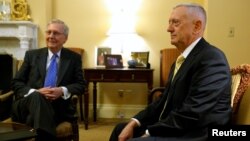The incoming Trump administration faced its first test on Capitol Hill Wednesday, as House Republicans, trying to speed up the nomination of the president-elect’s pick for secretary of defense, called a government funding bill into question just hours before it was to expire.
The debate strikes at the heart of a long-held principle of American government that separates the military from the civilian.
It began when House Republicans added a waiver to the short-term continuing resolution (CR). The waiver would expedite the process of allowing defense nominee retired Gen. James Mattis to bypass a nearly 70-year-old law requiring former members of the military to wait seven years after their military service before serving in a civilian post.
Mattis is ineligible to serve as secretary of defense since he retired from the military in 2013.
The waiver limits debate on the issue in the Senate to 10 hours and would forestall delaying tactics in the chamber thereby speeding up the process.
‘Cornerstone’ of democracy
“Civilian leadership of the military has been a cornerstone of our democracy since the founders, and for good reason,” House Minority Leader Nancy Pelosi said in a statement released Tuesday.
“The American people are entitled to regular order and thoughtful scrutiny of nominees and any potential waivers. Brushing aside the law that enshrines civilian control of the military without discussion, in a massive must-pass funding bill, would set a terrible precedent,” Pelosi said.
“Decisions about war and peace have to have a civilian input,” Lawrence Korb, a senior fellow at the Center for American Progress, told VOA. Korb was also an assistant secretary of defense in the Reagan administration.
“We are also very concerned about a separation of powers,” he added. “Only Congress can declare war, and they raise an Army and Navy, so we are very, very concerned that we would have an over-militarization of our foreign policy.”
“Our view is it ought not to be in the CR,” Democratic Whip Steny Hoyer told reporters in a briefing Tuesday. Some Democrats objected to the insertion of the waiver into the short-term spending bill that funds the government past a December 9 deadline, arguing it does not give lawmakers sufficient time to consider the key appointment.
‘Process is preserved’
Other Democrats, however, welcomed the appointment of Mattis.
“I think the process is preserved,” Congressman Adam Smith, the ranking Democratic member of the House Armed Services Committee, told VOA. “The language just calls for an expedited process, but expedited around here is a relative term. We’ve got at least six weeks, that seems like more than enough time for people to become informed on the issue.”
President-elect Trump will be inaugurated in six weeks.
In an opinion piece for national newspaper USA Today, Congressman Seth Moulton, who served under Mattis in Kuwait, wrote that the general was “one of the most thoughtful strategic thinkers we have.”
If all of Trump’s appointments are confirmed, retired generals will head the National Security Council, departments of defense and homeland security; with the possible addition of David Petraeus, who is being considered for the secretary of state post.
But Republican Congressman Dana Rohrabacher, who has also been in talks with Trump for the position of secretary of state, said the military presence in the president-elect’s cabinet could be beneficial.
“Generals actually are not just one stereotypical, militaristic people, some of them are intellectual and are very thinking people,” Rohrabacher told VOA. “A lot of generals have seen blood and are not anxious to have more bloodshed.”
Watch: Trump Announces Mattis as Defense Secretary Nominee
Civilian-military separation
While many former generals have gone on to become president, Michael O’Hanlon, a senior fellow at the Brookings Institution, told VOA the separation between civilian and military dates back to the divisions of power created at the founding of the nation. The need for those separations only increased following the military buildup during the two world wars, he said.
“The whole economy and much of the system of governance got focused on winning war, and therefore we got very worried that there might be a difficulty in trying to keep the country independent of these broader purposes of trying to make sure the country could never be fully focused on a military mission,” O’Hanlon said.
Even while the developing Trump administration contains a number of ex-military members, O’Hanlon said the law isn’t the only check and balance separating the military from the civilian.
“In today’s world, with the kind of generals we produce in our military and with the kind of strong civilian oversight the White House has over the Department of Defense, I actually don’t think it’s a pressing concern,” he said.








